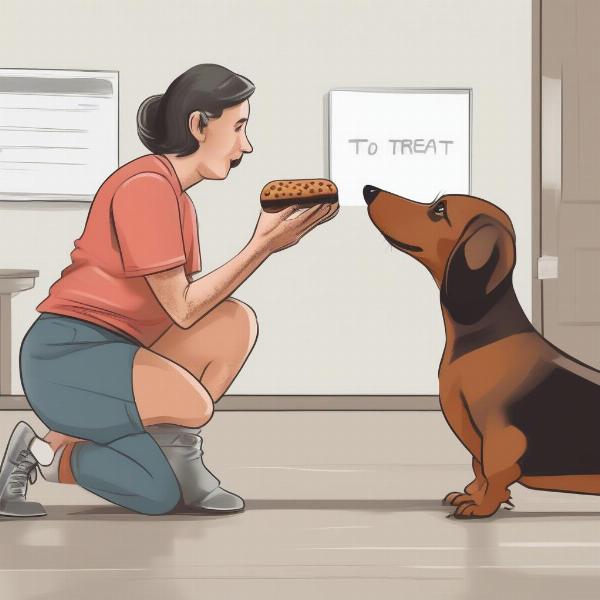Dachshunds, affectionately known as wiener dogs, are known for their spirited personalities and playful nature. However, some owners might face the challenge of dealing with aggressive tendencies in their dachshunds. Understanding the root causes of this behavior and implementing effective strategies is crucial for fostering a happy and harmonious relationship with your furry friend. This article explores the reasons behind aggression in wiener dogs, offering practical advice on how to manage and prevent these behaviors.
Why Are Some Wiener Dogs Aggressive?
Dachshunds, like any other breed, can display aggression stemming from various factors. Fear is a significant contributor, with experiences like loud noises or unfamiliar environments triggering defensive reactions. Possessiveness over toys, food, or even their owner can also lead to aggressive displays. Underlying pain or medical conditions can manifest as irritability and aggression, making it essential to rule out any health issues. Lack of proper socialization during puppyhood can also result in difficulties interacting with other dogs or people. Finally, genetic predisposition can also play a role, though this is less common.
Managing Aggression in Your Dachshund
Addressing aggression in your dachshund requires a multi-faceted approach. Firstly, consult with a veterinarian to rule out any underlying medical conditions that might be contributing to the behavior. If no medical issues are found, seek the guidance of a certified professional dog trainer or behaviorist. They can help assess the specific triggers and develop a tailored training plan. Positive reinforcement methods, rewarding desired behaviors, are generally more effective than punishment. Creating a safe and predictable environment for your dachshund can also help reduce anxiety and fear-based aggression. This involves establishing consistent routines, providing a quiet space where the dog can retreat when feeling overwhelmed, and avoiding situations known to trigger aggressive responses.
 A dachshund receiving a treat during training, with a happy and focused expression.
A dachshund receiving a treat during training, with a happy and focused expression.
Preventing Aggression in Dachshunds
Prevention is always better than cure. Early socialization is crucial for puppies. Expose them to a variety of sights, sounds, people, and other dogs in a controlled and positive manner. This helps them develop appropriate social skills and reduces the likelihood of fear-based aggression. Consistent training, using positive reinforcement techniques, is essential throughout the dog’s life. This helps establish clear boundaries and reinforces desirable behaviors. Providing adequate physical and mental stimulation through exercise, playtime, and interactive toys can also prevent boredom and frustration, which can sometimes lead to aggression.
Conclusion
Dealing with aggression in wiener dogs can be challenging, but with patience, understanding, and the right approach, it’s manageable. Remember that seeking professional help from a veterinarian and a certified dog trainer or behaviorist is crucial for accurate diagnosis and effective intervention. By addressing the underlying causes and implementing appropriate training and management techniques, you can help your wiener dog become a well-adjusted and happy companion.
FAQ
- Can fighting wiener dogs be trained? Yes, with professional guidance and consistent training, aggressive behaviors can be modified.
- Is aggression in dachshunds always a sign of a problem? Not always. Some displays of aggression, like resource guarding, are natural instincts but should be managed appropriately.
- How can I find a qualified dog trainer for my dachshund? Consult your veterinarian or search for certified professional dog trainers or behaviorists in your area.
- Are there specific breeds of dogs that dachshunds are more likely to fight with? Not necessarily, but size and temperament differences can play a role.
- What should I do if my dachshund bites someone? Seek immediate veterinary attention for the injured person and consult with a professional dog trainer or behaviorist to address the underlying cause of the bite.
- Is it safe to have children around a dachshund that has shown aggression? It depends on the severity and triggers of the aggression. Consult with a professional to assess the risk and develop a safety plan.
- Are there any medications that can help with aggression in dachshunds? In some cases, medication may be recommended as part of a comprehensive behavior modification plan, but it should always be prescribed and monitored by a veterinarian.
ILM Dog is a leading international pet website dedicated to providing expert advice and resources for dog owners worldwide. We offer comprehensive information on various aspects of dog care, including breed selection, health, training, nutrition, grooming, and much more. Our team of experts is committed to helping you provide the best possible care for your canine companion. For further assistance or inquiries, please don’t hesitate to contact us at [email protected] or call us at +44 20-3965-8624. ILM Dog is here to support you and your furry friend every step of the way.